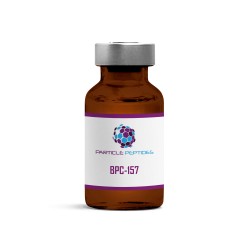- today

BPC-157, a penta-decapeptide naturally present in human gastric juices, has become a subject of research in modern regenerative medicine in recent years. This exceptional peptide accelerates wound healing, strengthens the vascular network and protects nerve tissue. No wonder scientists have named it the “Body Protection Compound”.
Unlike conventional supplements, BPC-157 affects the cellular communication pathways themselves. It increases the expression of growth receptors and stimulates fibroblasts to produce collagen – exactly what damaged tissue needs to become functional muscle, tendon or skin again.
How BPC-157 promotes tissue regeneration
BPC-157 promotes the formation of new blood vessels and dilates existing capillaries. Thanks to this, oxygen and necessary nutrients quickly reach the site of damage. Researchers studied its effect in detail on rats with severely damaged Achilles tendons. Administration of BPC-157 significantly reduced inflammation, promoted collagen formation and accelerated overall recovery.
The effects of BPC-157 were not only seen in muscle and tendon injuries. When the researchers applied this peptide directly to skin wounds in rats, they observed accelerated healing and a significant reduction in inflammatory markers. Its effectiveness has also been shown in more challenging conditions, for example in mice that suffered severe burns covering up to 20% of their bodies. In this case too, BPC-157 restored damaged tissue and reduced inflammatory processes.
BPC-157 is a powerful tool in the treatment of various types of wounds, whether superficial abrasions, deep injuries or extensive burns. It is therefore not surprising that the world of sports medicine is increasingly interested in this peptide. Athletes who often face muscle, tendon or ligament injuries can shorten their recovery time and return to the running tracks, fields or competition stages faster thanks to this peptide.
Furthermore, the research has shown that BPC-157 reduces the response to pain induced by chemical and mechanical stimuli, including both prostaglandin-dependent and -independent pain. It offers hope for solving chronic and acute pain without the need for high doses of conventional medications.
Neuroprotection and gastrointestinal health
The gastrointestinal tract and the brain communicate with each other through the "gut-brain" axis. We can imagine it as a living highway full of signals that travel back and forth, affecting our digestion, emotions and mental health. In this connection, BPC-157 plays an exceptional role. As an active bridge between the gut and the brain, it strengthens balance and promotes regeneration in both systems.
BPC-157 significantly reduces oxidative stress in neurons and stabilises the fine synaptic structures that act as connections between individual nerve cells. The result is better memory, clearer thinking and a more balanced mood.
In addition to its neuroprotective effect, BPC-157 also exhibits remarkable hepatoprotection.
It has been shown to be able to mitigate the harmful effects of non-steroidal anti-inflammatory drugs (NSAIDs), which often disrupt the intestinal barrier and may cause liver damage.
Similarly, it protects the body from the toxic effects of alcohol. BPC-157 strengthens the intestinal wall, reduces inflammation and prevents the formation of ulcers, whether in the stomach, small intestine or large intestine. Thanks to these regenerative and protective properties, BPC-157 finds application in the treatment of serious intestinal diseases, such as Crohn's disease or ulcerative colitis. Both of these conditions are associated with chronic inflammation and damage to the intestinal wall.
Simply put, BPC-157 is not fighting on just one front. Its effects range from the nervous system to the muscles and tendons and even the gastrointestinal tract. But what about safety?
No serious adverse effects were noted in a systematic review of clinical and preclinical data. The most common side effect includes temporary redness or itching at the injection site. Oral formulations may exceptionally cause mild nausea.
SOURCES:
https://pubmed.ncbi.nlm.nih.gov/34380875/
https://pubmed.ncbi.nlm.nih.gov/11718984/
https://pubmed.ncbi.nlm.nih.gov/34324435/
https://pubmed.ncbi.nlm.nih.gov/34380875/
https://pubmed.ncbi.nlm.nih.gov/34380875/
Related products
BPC-157 5mg
- In stock









